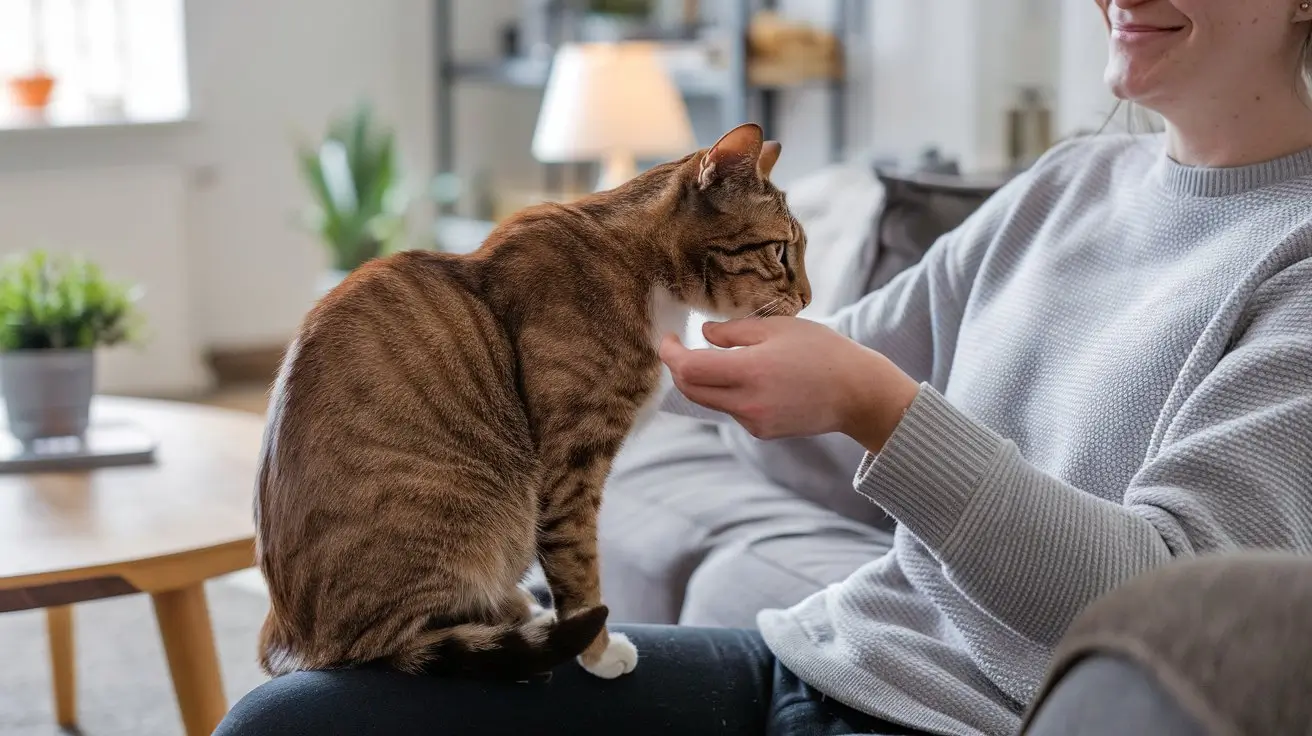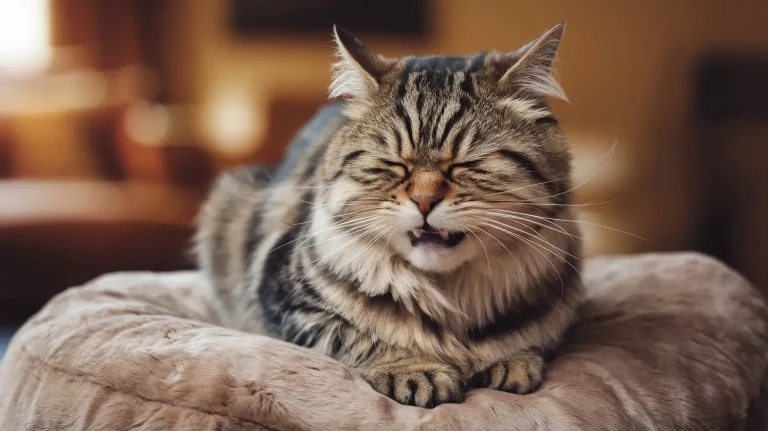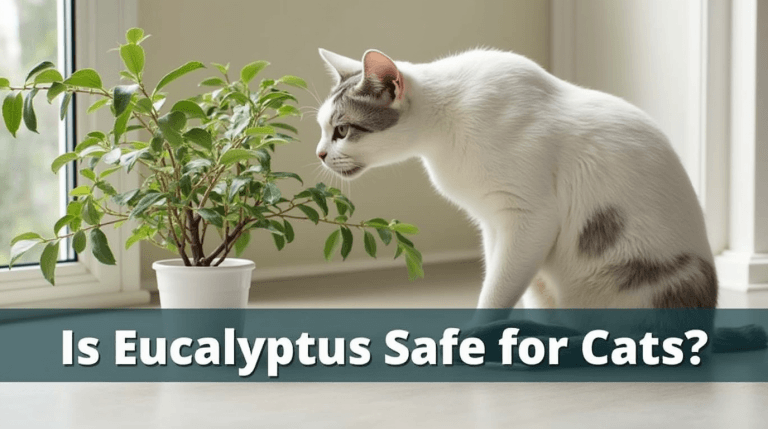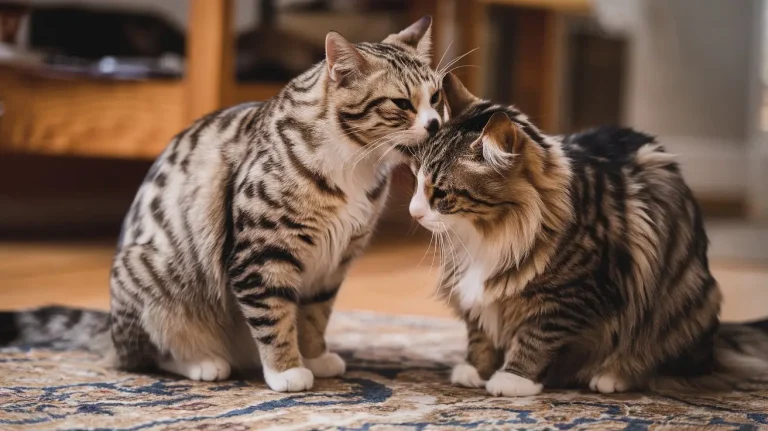If you’ve ever been on the receiving end of your cat’s rough, sandpaper-like tongue, you might wonder, “Why does my cat lick me?” While it may seem like an odd or random behavior, licking is a fascinating aspect of feline communication and affection. For cats, licking goes beyond simple grooming—it’s a way to express emotions, mark their territory, and even bond with their favorite humans.
Understanding why your cat licks you can deepen your connection and help you better meet their emotional and physical needs. Whether it’s a sign of love, a comforting habit, or a subtle message, this behavior offers valuable insight into your feline friend’s world. In this blog, we’ll explore the reasons behind cat licking, what it signifies, and how you can respond to it.
Table of Contents
Why Do Cats Lick Their Owners?
Cats have a variety of reasons for licking their owners, and understanding this behavior can shed light on how your feline friend communicates with you. Unlike dogs, who may lick as part of their instinctive greetings or excitement, a cat’s licking behavior is deeply rooted in their need for bonding, grooming, and comfort. Let’s explore the primary reasons why cats lick their humans:
1. Grooming and Affection
One of the most common reasons cats lick their owners is as an extension of their grooming behavior. In the wild or among other cats, grooming serves as a way to clean, maintain fur, and build social bonds. When your cat licks you, they may be treating you like part of their family or “tribe.”
This licking is a sign of affection and can be thought of as a loving gesture. Just as a mother cat will lick her kittens to groom them and reinforce her bond, your cat may lick you to show care and affection. For many pet owners, this is a heartwarming experience, as it signifies that your cat feels safe, secure, and emotionally connected.
2. Marking Their Territory
Cats are territorial animals, and licking is a way for them to mark you as “theirs.” When a cat licks you, they are transferring their scent to you, signaling to other animals that you belong to them. This is a normal behavior for cats, and while it may seem like an innocent act, it can also be an expression of possessiveness.
This territorial behavior is especially common in cats that are very attached to their owners and may happen more frequently when you’re the one providing their food, shelter, and care. Your cat’s scent-marking behavior is their way of establishing and reaffirming the bond they share with you.
3. Seeking Comfort and Stress Relief
Sometimes, licking is a form of self-soothing for cats. If your cat is feeling anxious, stressed, or overstimulated, licking can provide a sense of comfort and relief. In stressful situations, cats may resort to grooming behaviors to calm themselves, and this can extend to licking their humans.
If your cat licks you during moments of uncertainty, such as when they’re nervous about a visitor or a loud noise, it may be their way of finding reassurance. This behavior can also help them regulate their emotions and ease feelings of discomfort.
4. Showing Trust and Bonding
Licking can also be a sign that your cat trusts you completely. Cats are naturally independent creatures, and they generally reserve licking as a behavior for close companions, such as their mother, littermates, or other trusted individuals. When your cat licks you, it may be their way of saying, “I trust you” and “You are part of my family.”
This type of bonding behavior is crucial in developing a strong emotional connection with your cat. It’s one of the many ways cats show affection, alongside purring, nuzzling, or simply resting on your lap.
5. Mimicking Kittenhood Behavior
In the early stages of their lives, kittens rely on their mothers to groom them by licking their fur. As adult cats, some may continue this behavior as a comforting and instinctive act, even toward their human companions. If your cat licks you like a mother cat would groom her kitten, it might be a sign of deep affection or an attempt to recreate that feeling of comfort and safety they had as kittens.
Does My Cat Lick Me Because They Love Me?
It’s one of the most endearing behaviors a cat can display: the soft, persistent licking of your hands, face, or even your hair. If you’ve ever been the recipient of this affection, you’ve likely wondered, “Does my cat lick me because they love me?” While cats can be enigmatic creatures, their licking behavior often signifies a strong emotional bond. Let’s explore whether licking is truly a sign of love and affection from your feline companion.
1. Licking as an Expression of Affection
For many cat owners, a cat’s licking behavior is seen as a sign of love, similar to how humans express affection through hugs or kisses. In the wild, cats often lick each other as part of their grooming rituals, and this grooming behavior plays a significant role in their social structure. Cats groom one another to reinforce relationships, and when your cat licks you, it can be their way of showing that they consider you a close member of their “tribe.”
This affectionate grooming is a bonding activity, and cats generally reserve it for individuals they feel safe and comfortable with. If your cat is licking you frequently, especially on your face or hands, it may be a clear indicator that they view you as a beloved companion.
2. Licking to Strengthen the Bond
Cats often lick their owners to deepen the bond between them. Just as a mother cat will groom her kittens to nurture and care for them, adult cats will continue this behavior as a way to reinforce emotional connections. By licking you, your cat is building trust and demonstrating their affection, much like a child or a close family member might shower you with love through physical gestures.
In fact, cats typically perform this behavior with other pets or family members they share a close relationship with. If your cat licks you regularly, it’s a good sign that they feel bonded to you. It’s not just about grooming—it’s about maintaining and nurturing that close connection.
3. Mimicking Kittenhood Behavior
When kittens are born, they depend on their mothers for grooming and comfort. Mother cats lick their kittens as a means of cleaning them, but also to provide a sense of security and affection. As your cat matures, they may carry this behavior into their adult relationships. Licking you could be their way of reliving that sense of safety and love they felt as kittens under their mother’s care.
For many adult cats, the act of licking is a learned behavior from kittenhood that has evolved into a comforting and instinctive display of affection toward their humans. If your cat licks you in a similar way to how they would groom another cat or a kitten, it’s an even clearer sign that they see you as part of their family, and that their licking is a form of love.
4. The Purring Connection: A Sign of Comfort and Trust
Often, when a cat licks you, they will also purr—a behavior associated with contentment and trust. Purring is another way cats express affection, and when combined with licking, it’s a clear indication that your cat is feeling relaxed, safe, and emotionally connected to you. If your cat is licking you while purring, this reinforces the idea that they are showing love through both physical and vocal expressions of contentment.
5. Licking as a Symbol of ‘Ownership’ or Attachment
While the idea of “love” in the animal world is not always the same as human love, cats do develop deep attachments to their owners. When your cat licks you, they could be expressing a form of emotional attachment, indicating that they feel a sense of comfort, affection, and even dependence on you. This can be seen as a sign of affection, but it also shows that your cat views you as an integral part of their life, someone who provides safety, food, and companionship.
6. Cats Lick to Show Gratitude
Another reason for licking is the expression of gratitude. If you’ve been particularly attentive to your cat, whether it’s by providing food, giving them attention, or simply being present, they may show their appreciation by licking you. Cats have different ways of saying “thank you,” and licking can be one of those subtle yet meaningful gestures. If you’ve been particularly affectionate or have offered your cat comfort, licking can be their way of showing appreciation for your care.
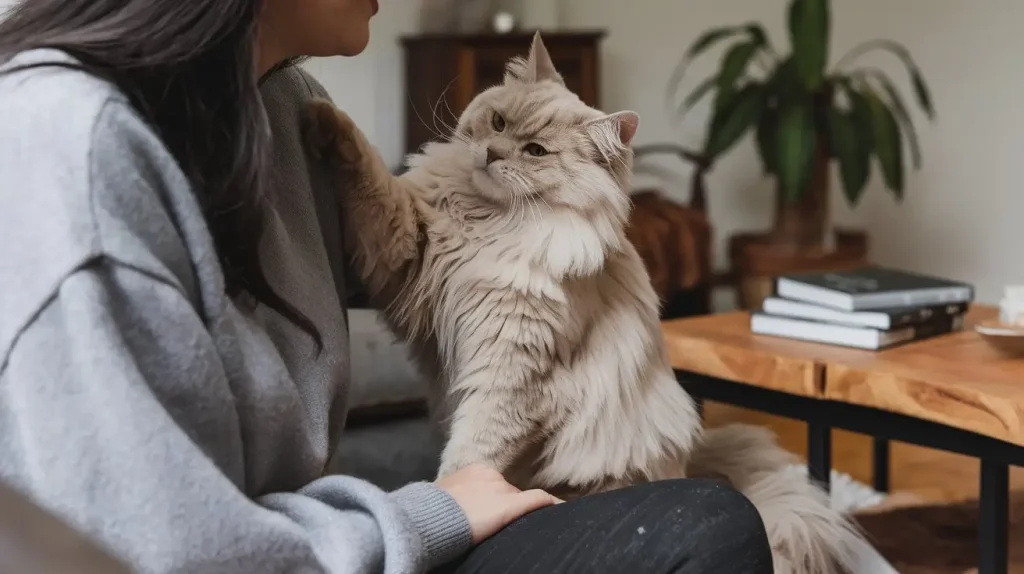
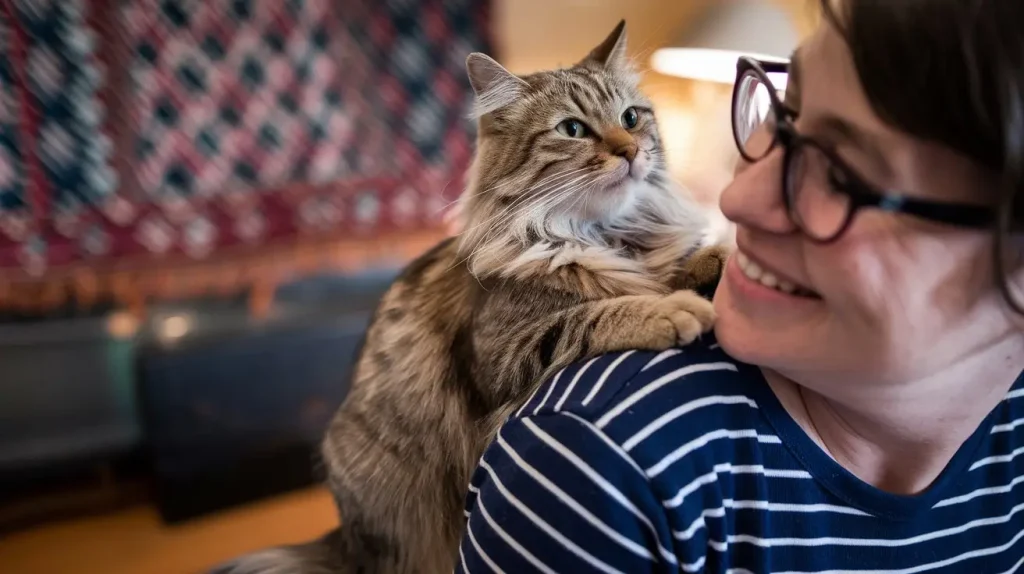
Is It Normal for Cats to Lick Humans?
Cats, like many animals, have distinct ways of communicating, and licking is one of the more curious and frequent behaviors that can leave pet owners wondering if it’s normal. While many pet owners enjoy receiving affectionate licks from their cats, others may be concerned if it happens too often or seems out of the ordinary. Understanding whether it’s normal for cats to lick humans is crucial for interpreting their behavior and ensuring both you and your cat are comfortable and healthy.
1. Licking Is a Common Behavior for Cats
First and foremost, it’s important to understand that licking is a completely natural behavior for cats. In the wild, cats lick themselves and other cats to groom, mark territory, and bond. This grooming behavior is ingrained in their instincts and, for domestic cats, it often extends to their human companions as a way of showing affection, marking territory, or simply as a method of communication.
In fact, licking is one of the most common behaviors for cats, and it typically begins early in kittenhood when their mother licks them to groom and comfort them. As adult cats, they carry this behavior with them and may use it in different contexts with their human caregivers. Whether your cat licks your hands, face, or even your feet, it’s a normal behavior that usually signifies a form of bonding and trust.
2. When Licking Is a Sign of Affection
When your cat licks you, especially if they’re doing it in a calm and relaxed manner, it’s generally a sign of affection. Just as cats groom each other in the wild to maintain their social bonds, they often groom their human family members as a way of showing love and care. This behavior helps reinforce their connection with you and signals that they trust you.
If your cat is licking you on your face, hands, or arms, it’s likely their way of expressing affection. In many cases, cats will also purr while licking, which further emphasizes that the behavior is linked to positive feelings. This kind of licking is perfectly normal and a clear indicator that your cat feels safe and emotionally connected to you.
3. Licking as Territory Marking
Cats are territorial creatures by nature, and they use scent-marking behaviors to establish their territory. When your cat licks you, they are not only grooming you but also transferring their scent onto you. This is a subtle way for your cat to mark you as part of their territory, showing other animals (or even other pets in your home) that you belong to them.
Although it might seem a bit strange to think of your cat “claiming” you, this is actually a very normal and natural part of feline behavior. Cats feel a strong sense of attachment to their human companions, and licking is one of the ways they reaffirm that bond. If your cat licks you in places like your hands, face, or even hair, it’s not necessarily a sign of ownership in a negative way—it’s just their way of saying, “You’re mine.”
4. Licking as Comfort and Stress Relief
In addition to bonding, licking can also serve as a self-soothing mechanism for cats. Just like how humans might comfort themselves by engaging in certain habits or rituals, cats use licking as a form of stress relief. If your cat is feeling anxious or nervous, they might lick you to seek comfort or reassurance. Licking provides a calming effect, helping them to reduce feelings of anxiety.
If your cat licks you more frequently during stressful situations—such as when there are loud noises, a change in routine, or the presence of strangers—it’s likely they are trying to comfort themselves. This behavior can be a normal response to stress, so it’s important to watch for other signs of anxiety, such as hiding, excessive grooming, or changes in behavior.
5. Is Excessive Licking a Cause for Concern?
While occasional licking is entirely normal, it’s important to keep an eye on how often your cat licks you. If your cat begins to lick you excessively or seems obsessed with licking one particular area of your body, it could be a sign of an underlying issue. Some possible causes of excessive licking include:
- Boredom: Cats who are not mentally or physically stimulated enough might turn to licking as a form of entertainment or comfort.
- Stress or Anxiety: Cats may lick excessively when they feel anxious or insecure. Changes in their environment, routine, or the addition of a new pet or person can trigger this.
- Health Problems: In some cases, excessive licking can be related to health issues, such as skin irritation, allergies, or even digestive problems. If your cat’s licking seems excessive, accompanied by changes in behavior, or if they’re licking at themselves or in unusual spots, it’s a good idea to consult your veterinarian.
6. How to Handle Your Cat’s Licking
In most cases, it’s completely normal for your cat to lick you, and it’s a behavior to be cherished. However, if you’re not comfortable with your cat’s licking or if it becomes excessive, it’s important to set boundaries. Gently redirect your cat’s attention by offering toys or engaging in play sessions, which can help curb the licking behavior. Additionally, ensure your cat’s emotional needs are met through regular attention, a stimulating environment, and healthy routines.
If your cat’s licking is linked to anxiety or stress, try to identify the underlying cause and address it. Reducing stress, providing safe spaces, and introducing calming products like pheromone diffusers can help ease your cat’s anxiety and, in turn, reduce excessive licking.
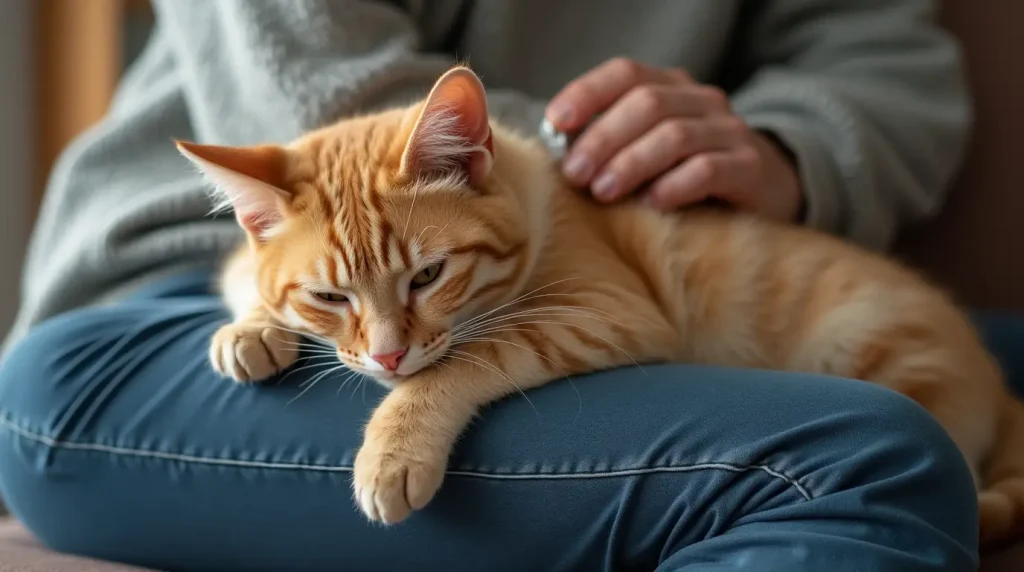
How to Respond to Your Cat’s Licking Behavior
When your cat licks you, it can feel like a special moment of bonding and affection. However, there are times when you may want to manage or redirect this behavior, especially if it becomes excessive or is done in certain situations that make you uncomfortable. Understanding how to respond to your cat’s licking behavior is important for maintaining a healthy relationship and ensuring your cat’s emotional and physical well-being. Here are some thoughtful ways to respond to your cat’s licking:
1. Embrace Licking as a Sign of Affection
If your cat’s licking is gentle and seems to be motivated by affection, the best response is often to reciprocate the love. Cats show their affection in a variety of ways, and licking is one of the most endearing. If your cat licks your hands, face, or arms, consider it a positive sign of trust and bonding. You can pet or gently scratch your cat in return to strengthen the connection.
When your cat licks you, it’s an opportunity to foster a deeper bond by maintaining positive interactions. You can encourage this behavior by rewarding your cat with attention, cuddles, or playtime, making it clear that you appreciate their display of love.
2. Provide Alternatives to Licking
If you’re not comfortable with your cat’s licking or if it becomes excessive, you can offer alternatives to redirect their behavior. Licking can sometimes be a result of boredom, excess energy, or a need for attention. To manage this, engage your cat in interactive play or provide new toys and activities that stimulate their mind and body.
Investing in puzzle toys, treat-dispensing toys, or engaging in regular play sessions with your cat can help reduce their desire to lick and provide a healthier outlet for their energy. The more your cat is mentally and physically engaged, the less likely they are to resort to repetitive behaviors like excessive licking.
3. Set Boundaries in a Gentle Way
While licking can be a sign of affection, there may be times when you want to set boundaries, especially if your cat’s licking becomes persistent or overly demanding. The key to setting boundaries is to do so gently and without causing stress or frustration for your cat.
If your cat begins licking you and you want them to stop, calmly withdraw from the situation. Gently move your hands away or turn your body so that they can’t access the area they are licking. Avoid yelling or reacting with frustration, as this can make your cat feel anxious or confused, potentially increasing their licking behavior. Instead, use positive reinforcement when they stop licking to reinforce desirable behavior.
4. Addressing Stress or Anxiety-Driven Licking
If your cat’s licking appears to be linked to stress or anxiety—such as licking excessively during stressful situations (e.g., when there’s a change in routine or when they encounter unfamiliar people)—it’s important to address the root cause of their anxiety. Licking can be a self-soothing behavior for cats who are feeling overwhelmed, and in these cases, it’s essential to create a calm, predictable environment to help reduce their stress.
Consider implementing calming strategies like using feline pheromone diffusers, playing soft, relaxing music, or providing quiet spaces for your cat to retreat to when they feel stressed. If your cat is struggling with anxiety that seems severe or persistent, consult your veterinarian for advice on how to address the issue, as they may recommend behavioral therapy or medication.
5. Check for Health Issues If Licking Becomes Excessive
While occasional licking is normal, excessive licking may be a sign of an underlying health problem, such as allergies, skin irritation, or even digestive issues. If you notice that your cat is licking the same area excessively, or if the licking behavior is accompanied by signs like hair loss, redness, or skin lesions, it’s important to consult a veterinarian.
Excessive licking can also be a symptom of obsessive-compulsive behaviors or stress-related disorders. A veterinary professional can help rule out any medical conditions and provide you with the guidance needed to address the issue. Keeping an eye on any changes in your cat’s licking pattern will help you catch potential health problems early.
6. Reassure Your Cat and Reinforce Positive Behaviors
In some cases, your cat might lick you for reassurance or as a way to communicate a need for comfort. If your cat licks you when they’re feeling anxious or unsure, provide them with reassurance through gentle petting, calm words, and a stable routine. Cats thrive in environments where they feel secure, and offering consistency in your interactions can help your cat feel more confident and reduce the need for excessive licking.
Reinforcing positive behavior is essential. If your cat licks you in a way that feels positive, reward them with attention or a treat. This will help them understand that licking is a healthy way to express affection and will make them feel more secure in their bond with you. Positive reinforcement will encourage your cat to continue using this behavior as a means of expressing their feelings, while also promoting a harmonious relationship.
7. When to Seek Professional Help
If you find that your cat’s licking behavior is problematic—whether due to anxiety, compulsiveness, or health issues—it’s worth seeking professional help. A veterinarian or an animal behaviorist can assess your cat’s behavior and provide tailored advice for managing it. In some cases, behavior modification techniques or medication may be necessary to address underlying concerns.
Veterinarians can also rule out medical issues such as allergies, pain, or dermatological problems, which may be contributing to the licking behavior. Once any potential health concerns are addressed, you can work with your cat to promote a healthier, more balanced approach to their behaviors.
Wrap-up : Why Does My Cat Lick Me
Cats licking their owners is a common and natural behavior that holds various meanings. Often, it is a sign of affection and bonding, as cats groom their human companions the same way they would other members of their social group. Licking can also be a method of marking territory, providing comfort during times of stress, or simply expressing trust and care. Whether your cat licks you to show love or to soothe themselves, it’s generally a positive sign of their connection to you.
However, while licking is often a warm gesture, it’s important to monitor your cat’s behavior for any signs of stress or health issues. Excessive licking, especially in one area, may indicate an underlying concern such as anxiety, boredom, or even physical discomfort. If you notice any concerning patterns, it’s a good idea to consult with a veterinarian to ensure your cat’s health and well-being.
Ultimately, licking is a unique form of feline affection, and appreciating it as part of your cat’s natural behavior can deepen your bond. So, the next time your cat licks you, remember that it’s likely their way of saying, “I love you,” even if it’s sometimes accompanied by a few curious licks!

